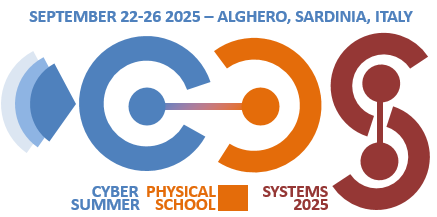Gianfranco Deriu – University of Cagliari (Italy)
Daniel Madroñal – Universidad Politécnica de Madrid (Spain)
Paolo Meloni – University of Cagliari (Italy)
Claudio Rubattu – University of Sassari (Italy)
Leonardo Suriano – Universidad Politécnica de Madrid (Spain)
Gianfranco Deriu – University of Cagliari (Italy)
Wednesday 25th – Cognitiveness at the edge: Platforms, Models, Tools – an insight into the ALOHA project
Gianfranco Deriu is research assistant at the Department of Electrical and Electronic Engineering (DIEE) since October 2015. He received his
degree in Electronic Engineering in 2015 at the University of Cagliari. His main research interests are image recognition and CNNs. He is currently working on reconfigurable hardware acceleration of CNNs for artificial vision focusing on deep networks. In ALOHA he is responsible of the overall toolflow integration and testing.
Daniel Madroñal – Universidad Politécnica de Madrid (Spain)
Tuesday 24th – Cerbero Tutorial – Design Flow for Heterogeneous Embedded Computing Infrastructures
Daniel Madroñal received his B.Sc. degree in Communication Electronics Engineering from Universidad Politécnica de Madrid (UPM), Spain, in 2014, and his M.Sc. degree in Systems and Services Engineering for the Information Society from Universidad Politécnica de Madrid (UPM), Spain, in 2015. He is currently a student of the PhD degree in Systems and Services Engineering for the Information Society at the Electronic and Microelectronic Design Group (GDEM), UPM. In 2015, he stayed 4 months at the National Institute of Applied Sciences (INSA), France, as an interchange student of the M.Sc. degree. His research interests include high-performance multi- and many-core processing systems, real-time hyperspectral image processing and the automatic optimization of the energy consumption in high-performance systems. He is author or co-author of 8 indexed journals and 15 contributions to technical conferences.
Paolo Meloni – University of Cagliari (Italy)
Wednesday 25th – Cognitiveness at the edge: Platforms, Models, Tools – an insight into the ALOHA project
Paolo Meloni is assistant professor at the Department of Electrical and Electronic Engineering (DIEE) in the University of Cagliari since 2012. From the same institution he received a Master degree in Electronic Engineering in October 2004, and a PhD in Electronic Engineering and Computer Science in October 2007, defending the thesis “Design and optimization techniques for VLSI network on chip architectures”. He works at the EOLAB-Microelectronics Lab since November 2004. His research activity is mainly focused on the development of advanced digital systems, with special emphasis on the application-driven design and programming of multi-core on-chip architectures and FPGAs. He is author of a significant track of international research papers, reviewer for international scientific journals and conferences, and tutor of many bachelor, master and PhD students’ thesis in Electronic Engineering and Computer Science. He is teaching the course of Advanced Embedded Systems at University of Cagliari and recently acted as part of the technical board and as work-package leader in the research projects ASAM (www.asam-project.org) and MADNESS (www.madnessproject.org) and as a principal investigator in the national project “ELoRA: Low-power Real-time processing of neural signals for prosthetic Aids”. He has recently worked to the development of NEURAghe, an FPGA-based accelerator for Convolutional Neural Networks. He is currently scientific coordinator of the ALOHA (www.aloha-h2020.eu) project.
Claudio Rubattu – University of Sassari (Italy)
Tuesday 24th – Cerbero Tutorial – Design Flow for Heterogeneous Embedded Computing Infrastructures
He is a research assistant at the University of Sassari (Italy) and a PhD student at the INSA Rennes (France). Claudio received his degree in Electronic Engineering in 2015 at the University of Cagliari (Italy). After the graduation, Claudio joined the University of Cagliari, EOLAB group, to work on embedded system design in bio-medical applications. Then he moved at the University of Sassari to work on the H2020 CERBERO project (http://www.cerbero-h2020.eu) on Smart Cyber Physical System Design. In parallel, Claudio started (October 2017) a PhD programme at the INSA Rennes. Claudio’s main research are related to reconfigurable systems design and development of code generation tools for reconfigurable hardware/software architectures. Recent publications are related to dataflow-based design flows aimed at achieving predictability for systems that consider coarse-grained reconfigurable accelerators.
Leonardo Suriano – Universidad Politécnica de Madrid (Spain)
Tuesday 24th – Cerbero Tutorial – Design Flow for Heterogeneous Embedded Computing Infrastructures
After the Bachelor achieved at the beginning of 2007 at Polytechnic of Bari with the maximum grade “cum Laude”, Leonardo started to work in Milan as a hardware designer for Industrie Dial Face. After more than five years in that position, he decided to come back to the Academic and he started his master in the Polytechnic of Bari with a thesis developed during the Erasmus experience in the University of Glasgow with the maximum grade “cum Laude”. After the thesis, he moved in France working in the R&D for INRIA where he was involved in the project ARTIV1 (a mathematical model of the Primary Visual Cortex of Human Brain). In January 2016, Leonardo started his Ph.D. in the Universidad Politécnica de Madrid where he continued to work with complex heterogeneous systems. For his Ph.D. thesis, Leonardo received two prizes: the “Best Research Project” in the Industrial Research Meeting 2016 and the “Best Oral Session” in the “Simposio – Tu Tesi en 4 Minutos” of the Universidad Politécnica de Madrid in the 2018.

